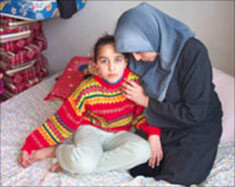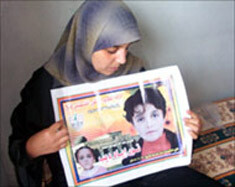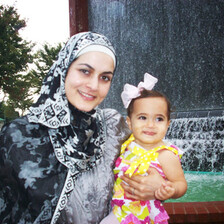Al Jazeera 3 February 2005

Nuran had asked for sweaters for her sisters before she was killed. (Aljazeera)

When Nuran died, a part of me died also, her mother said. (Aljazeera)
Ten-year-old Nuran Iyad Dib went to school as ecstatic as any schoolgirl should be. But this crisp winter day was special: she would receive her bi-annual report card. As it turned out, she passed with flying colors, which meant a gift from her parents, who had been saving up their dwindling funds for this occasion. The teacher’s comment on top of her report read: We predict a very bright future for Nuran.
But Nuran would have no such future, and her gift lies abandoned in a corner of her family’s grieving home. On the afternoon of 31 January 2005, Israeli sniper fire ripped through her face as she stood in her school’s courtyard, lining up for afternoon assembly.
The last thing Nuran’s mother remembers of her daughter before she left to school that morning was hearing her say her morning prayers, during which she recited a verse about God having created death - and life - as a test for mankind.
In retrospect, Nuran’s mother believes it was a premonition of what was to come. “Then she left for school. She was a completely selfless child. She was thinking of her sisters till the last second. She came back after she had left the house, and said ‘Mommy, it’s cold - please put some sweaters on my sisters before they leave’,” her mother said. “What more can I say except that she was a breath of fresh air in these hard times? Her name was Nur [light] and that’s exactly what she was.”
Her death has many here questioning Israel’s commitment to a ceasefire amid a one-sided truce and virtual period of calm. “We extended an olive branch to them and instead of reciprocating they cut our hand off,” Nuran’s mother cried, sitting in an unpainted cement-block bedroom with nothing but thin foam mattresses on the ground.
“What did she ever do to deserve such a fate? Or her sister, who saw Nura die in front of her? Every night she wails out in her sleep ‘Bring me my sister, bring me my sister’ ”.
Fifth schoolchild killed
But Nuran was not the first innocent Palestinian schoolchild to meet such a violent death in occupied Gaza. In fact, she was the fifth to be shot dead or maimed by Israeli occupation forces while on the premises of their UN-flagged schools in the past two years.

The blood of Raghda al-Assar 10, taints her copybook in the classroom. She was killed by Israeli bullets on September 7, 2004. (WAFA)
Two girls were killed in separate incidents in Rafah and Khan Yunus last year while sitting at their desks, and a little girl was permanently blinded in March 2003.
According to UNRWA’s spokesperson Paul Mccan, the UN relief organisation has repeatedly protested against the Israeli military’s indiscriminate firing into civilian areas in the occupied Palestinian territory. Nuran’s school, which is about 600 metres away from the border, has been hit on numerous occasions since the start of the conflict, he said. This is the first time the shots have had tragic consequences.
“We want to ask the world: Was Nuran holding an explosive belt around her waist? Was she toting a Kalashnikov? She knew no politics, only love,” her aunt Iktimal Husayn asked rhetorically. “She was supposed to bring home her report from school, but instead she brought home her death certificate.”
Nuran’s mother says minutes before receiving news of her daughter’s death she sensed something was not right. ”I asked her father about a beautiful picture of Noran we had taken a few years back. I wanted to see it. And then her baby sister dropped a large jar of chili sauce on the floor.”
Israeli denials
Witnesses say the children were clapping their hands and singing the national anthem when the firing started. One bullet pierced the hand of Aysha Isam al-Khatib, while the other hit Nuran in the head. She fell to the ground at once. Bystanders say they assumed she was unconscious until they noticed the pool of blood beneath her shattered skull.
A third bullet hit a young girl’s book bag, and was stopped in its tracks by one of her folders, only a few excruciating centimetres away from her spine. Eleven-year-old Salwa al-Khalifa was next to Nuran when the bullets struck. She described with disturbing composure well beyond her years the details of that bloody hour. “A bullet went in through her nose and came out of her neck. We all ducked. Several other bullets hit the window and school wall over there.”
A day after the incident, Israeli authorities said their initial investigation indicated it was fire from jubilant Palestinian police celebrating the return of Hajj pilgrims, not Israeli sniper fire, that killed Nuran.
Pockmarked walls
But the pockmarked wall of the UNRWA school, which stands 600m away from an Israeli sniper tower and far away from residential blocks, tells a different story. ”There is nothing around us here, and there were no pilgrims that we know of celebrating that day. There is just an outpost a few hundred metres away - one from which sniper fire has frequently hit our school,” school principal Siham al-Ghoff said.
Al-Ghoff says if the fire was indeed Palestinian, the bullet would not have hit Nuran in the face but rather landed on top of her head, as rifles fired in celebration usually point upwards.
Both Palestinian security sources and UN officials confirm the account, saying that the way the bullets were scattered along with witness testimonies, point to Israeli gunfire. “Everything is pointing to the fact that it was the Israelis. There were a number of shots, and the way they were scattered gives us an indication of the direction where they came from, and that corresponds with witness reports that the firing came from an [Israeli] APC or tank in the area,” one official said.
School goes on
Meanwhile, in Nuran’s school, life goes on. Girls who received top marks this term were rewarded with tins of toffee that they passed out enthusiastically to all visitors, a step taken by school counselors to attempt to normalise an abnormal situation. But in Nuran’s fourth-grade classroom, the mood was far from celebratory. ”The children are too afraid to go out for their recess, and many simply go to the bathroom and weep all day,” principal al-Ghoff said.
Counsellors have been trying to help the children work through the trauma of recent days. When asked to portray their conception of their classmate’s death, most drew tanks and Apache helicopters invading their school. ”I thought there’s a truce now, something like this would never happen. Now we’re trying to pick up the pieces,” al-Ghoff added.
Shattered lives
The Palestinian Authority has filed a formal complaint with the Israeli side about the girls’ shooting, but it is unlikely Nuran’s family will ever get answers about their daughter’s death.
Back in her family’s home, Nuran’s mother sat gazing in disbelief at her daughter’s report card, while her father Iyad stood weeping silently.
Nearby, an Israeli tank shell rattled the windows of the room, which together with young Nuran’s death served as a reminder that if there is any “calm” it has not yet reached Rafah. “When Nuran died, a part of me died also,” her mother said. “She was a bright light that was extinguished. For me, there can be no more peace.”
Laila El-Haddad is a journalist based in the occupied Gaza Strip. This article was originally published by aljazeera.net and reprinted on EI with permission.
Related Links




